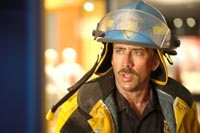If you had to pick a director to make the first major, big-budget, star-studded Hollywood movie about the September 11 terrorist attacks—and an inspirational movie, at that, about the heroism displayed by ordinary Americans that day—your first choice probably wouldn’t be Oliver Stone. From JFK to Natural Born Killers, his politically-charged and occasionally conspiracy-minded films are better known for picking at the nation’s wounds, rather than healing them. And yet, somehow, Stone has pulled it off with World Trade Center, which tells the story of two men who were rescued from the rubble of the twin towers. Rather than impose his vision on the story, Stone allows himself to become the conduit through which their story is told.
The film begins by depicting the sheer ordinariness of that morning, though a hint of Craig Armstrong’s ominous score, and the way the camera keeps turning towards those towers on the horizon, lets us know the day won’t stay that way. The characters, meanwhile, remain innocent of what is to come. Sgt. John McLoughlin (Nicolas Cage) wakes up early and silently checks in on his sleeping children before going to work at the Port Authority Police Department. Fellow officer Will Jimeno (Michael Peña) also drives into Manhattan, and kids around with his colleagues in the locker room. The police are told to be on the lookout for a runaway girl, and Jimeno tells a homeless man not to loiter on public property. It’s all very routine.
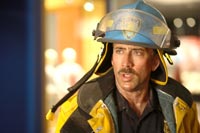
And then the first World Trade tower is struck. Stone, to his credit, does not go for the obvious money shots here; he does not mimic the news footage that we have all seen by recreating it with the latest developments in special effects. Instead, he depicts the first plane as a shadow cast against a New York skyscraper. The second plane is not depicted at all; instead, as McLoughlin, Jimeno and their colleagues make their way to the World Trade Center on a commandeered bus, one of them is told about the second attack while talking to his wife on his cell phone. The other officers don’t believe him—surely there must be some mistake—but then the bus turns a corner and they find themselves staring at the evidence, down the road.
By restricting what we see and hear to what the characters saw and heard, Stone allows us to experience their confusion and bewilderment. But if he avoids the obvious images, he also creates new images which, in their own way, also draw us into their experience. We see papers fall from the sky like overgrown snowflakes, and horrific images of people plunging to their deaths in the distance. And as McLoughlin and his colleagues stand in front of the tower, we are struck by how incredibly huge it is, and by how small this tiny group of tiny men is.
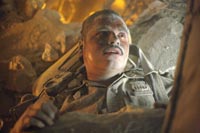
Even so, undaunted by the sheer scale of their mission, McLoughlin, Jimeno, and a couple of their fellow officers enter the building—but they have barely had time to find the equipment they need before one of the towers collapses, burying them in rubble. And there they remain for the duration of the movie. One of their colleagues survives the collapse of the first tower, only to be killed when the second tower collapses and pours even more debris down upon them. So it is left to McLoughlin and Jimeno, pinned down several feet apart from each other and mostly unable to move, to keep each other awake and to hope for a rescue before they die.
Stone, working from a script by newcomer Andrea Berloff, alternates between the trapped men and their homes—sometimes showing, in flashback, what life was like before the attacks, and sometimes showing how the families of these men try to cope with the fact that they have no idea what has happened to their loved ones. There are odd moments of humor, such as when McLoughlin tells Jimeno that he must survive so that he can finish remodelling the kitchen for his wife Donna (Maria Bello), or when Jimeno recalls disagreeing with his pregnant wife Allison (Maggie Gyllenhaal) over what to name their next child; such concerns might seem trivial in the face of death or an attack against the nation, and yet there is value in such details, because it is through them that intimate relationships are forged.
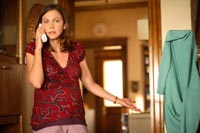
At the same time, the film does not shy away from the more negative effects of the stress that these families endure. We like to tell ourselves that we would bond together and stand up for each other in moments of crisis—and, broadly speaking, that is what World Trade Center shows people doing. But emergencies can also bring out our darker impulses, and there are scenes here of family members snapping at each other that feel awkwardly authentic. This film has been compared to the films of Ron Howard—especially Apollo 13, which also tells a true story of men trapped in life-threatening circumstances and the loved ones who must watch it all on TV—but there is a sharpness to these scenes that cuts just a little deeper.
The film also has a surprisingly high degree of Christian content. It’s there in the crucifixes that adorn the walls of private homes and hang from rescuers’ necks; it’s there in the Lord’s Prayer that McLoughlin shouts in a moment of peril; it’s there in a startling vision that Jimeno has when he slips into unconsciousness. It is especially there in a subplot involving David Karnes (Michael Shannon), a former marine who abandons his job in Connecticut, gets a haircut, and puts his old fatigues back on—all because he believes that God is calling him to New York. And once he gets there, he plays a key role in finding McLoughlin and Jimeno under all that rubble.
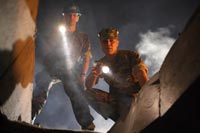
How you respond to the film’s depiction of Karnes may affect how you respond to the claim, frequently made in recent weeks, that Stone’s film is “non-political.” Unlike United 93, the Paul Greengrass film which focused on the terrorists and their plot against the United States, World Trade Center keeps the villains so far offscreen you could almost mistake it for a movie-of-the-week about a mining accident. It is Karnes who keeps the bigger political picture in view, by saying things like, “We’re at war,” or, “We’re gonna need some good men out there to avenge this.”
The film might be simply reporting, as honestly as it can, how the real-life Karnes reacted to the events of that day, and some will argue that this film supports current war efforts by reminding a forgetful public just why we are at war in the first place. Then again, the film subtly plays on the notion that current war efforts may be driven by an apocalyptic evangelical sensibility that some would say is just as problematic as the radical Muslim belief in jihad; before going to New York, Karnes meets his pastor, and the scene is set by a shot of a Bible opened to the first page of Revelation.
Whatever hints Stone might be dropping, he has at least done a superb job of capturing on film what that awful day was like. There are missteps along the way—among other things, the sudden appearance, late in the game, of relatively well-known actors like Stephen Dorff and Frank Whaley as rescue workers almost pulls you out of the movie—but for the most part, it works. If United 93 was the insider’s version, with scenes set at command centers and aboard one of the hijacked planes, World Trade Center allows us to relive the experience from the outsider’s point of view. In one scene, Jimeno’s wife walks down a lonely street late at night, and all the windows in all the houses glow in unison with the light of a single TV broadcast. Anyone who lived through that day will remember exactly what that was like.
Talk About It
Discussion starters- This movie is about two survivors. Why do you think this story was chosen for this film? What about the thousands of people who died? What would a movie about them be like? Do you think those stories should be told, too
- What do you make of all the Christian imagery? Do you think a miracle took place here? If so, why do you think there were so few miracles like this
- Do you think the film is “non-political”? Do you think the film is implying anything about the political or religious elements of that day? Explain.
The Family Corner
For parents to considerWorld Trade Center is rated PG-13 for intense and emotional content, some disturbing images (including distant images of people jumping from buildings, images of people covered in blood, and up-close images of people trapped and dying under falling rubble) and language (half a dozen four-letter words, and a couple of uses of the Lord’s name in vain).
Photos © Copyright Paramount Pictures
Copyright © 2006 Christianity Today. Click for reprint information.
What Other Critics Are Saying
compiled by Jeffrey Overstreetfrom Film Forum, 08/17/06In 2001, as the nation was reeling from the terrorist attacks that were broadcast on live television, writers, artists, and journalists contemplated how these events would affect different areas of our lives, and how things would change. Some of these writers asked whether Americans would lose their appetite for big-screen horror and violent entertainment. (I addressed this very question in two special editions of Film Forum, here and here.)
Almost five years later, very little has changed. Disaster movies are still big business, and moviegoers consistently make bloody horror movies into huge successes. Whether this is a good or a bad thing — that’s open to discussion and debate. Some of these movies make money by sensationalizing violence and appealing to our appetite for excessive spectacle. Others give us perspective on terrorism and violence that proves meaningful and even comforting.
So it was inevitable that the event would inspire works of popular art and entertainment. In the days immediately following September 11, a familiar mantra was repeated by those who experienced it: “It was like a movie.” Now … it is a movie. Two movies, in fact.
The first, United 93, directed by Paul Greengrass, has become one of the year’s most highly acclaimed films, and there are already whispers about Oscar nominations—but the film’s low box office numbers made its big-screen release short-lived. The second film, Oliver Stone’s World Trade Center, opened last week, giving us different view of that these devastating events.
Christian film critics are giving the film positive reviews, impressed that Stone has reined in his tendency to provoke us with conspiracy theories and politics.
Steven D. Greydanus (Decent Films) compares the two films as well, and finds World Trade Center to be “more a sentimental melodrama than the story of an event. … Where Paul Greengrass’s brilliant United 93 crafted a documentary-like anatomy of events without presuming to get inside people’s heads or explain actions or motivations, World Trade Center is a more conventional Hollywood film, with dramatic dialogue, characters following clearly plotted arcs, and a swelling soundtrack to reinforce the mood.”
Greydanus also finds it ironic that Stone’s film is “as unabashed a tribute to heroism and human decency as Hollywood has produced in years.”
Harry Forbes (Catholic News Service) says, “[S]ome may be disappointed by the narrow focus here. … Nonetheless, Stone and screenwriter Andrea Berloff have given us an inspiring picture of bravery, fortitude and sacrifice in the face of enormous adversity, and whatever the film’s shortcomings, that’s undeniably a story worth the telling.”
“[T]he tightly interwoven themes of friendship, family and faith are among the most compelling of any film I’ve seen in a long time,” writes Adam R. Holz (Plugged In). “I couldn’t stop thinking about my wife, my parents and siblings, my close friends as I watched this drama unfold. … I was also impressed by the positive treatment given to a Christian man and the guiding role of his faith. … Still, like United 93, World Trade Center is not an easy film to watch.”
“Stone has shown admirable restraint in the visual presentation of the material here,” reports Christian Hamaker (Crosswalk). “It’s a total package that honors a wounded nation and the spirit of its diverse people. Like the actions of so many on that day, and in the days that followed, World Trade Center is something to be proud of.”
Most mainstream film critics were pleased with the results, but, as you might expect, films about subjects this controversial and sensitive will tend to provoke some strongreactions indeed.

